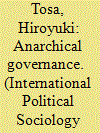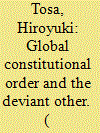| Srl | Item |
| 1 |
ID:
092298


|
|
|
|
|
| Publication |
2009.
|
| Summary/Abstract |
Beside the promotion of a politics of inclusion, implemented by governing at a distance, the global governmentality also promotes a politics of exclusion, such as establishing targeted governance that is aimed at deviant groups at the periphery of global politics. This highly disciplinary social control that is imposed upon the marginalized population sometimes leads to instances of the state of exception, in which people are forced to endure "bare lives." This kind of exception existing at the marginalized periphery of the neoliberal global governmentality becomes normal. This neoliberal governmentality creates an informal sector of an enormous scale, whose spatial representation is the global slum, and where vicious cycles of violence become normal.
|
|
|
|
|
|
|
|
|
|
|
|
|
|
|
|
| 2 |
ID:
158672


|
|
|
|
|
| Summary/Abstract |
The purpose of this article is to offer some reflections on how to interpret the International Criminal Court (ICC)’ s fractious relationship with Africa in the context of the historical lineage of a dual structure of the global constitutional order and further scrutinize its implications for life cycles of the international norm. First, we begin by setting out the ICC process (norm emergence) led by middle power sand global civil society during the early post-Cold War period. We then scrutinize the limits of this new normative order by focusing on its dualistic nature, as well as the asymmetrical relation between the Global North and the Global South, in particular African countries. Finally, we reexamine the remaining injustice issue inherent in the liberal normative order by paying attention to structural problems such as the predatory capitalism behind the serious humanitarian crisis, which international judicial interventions seem to have superficially mask.
|
|
|
|
|
|
|
|
|
|
|
|
|
|
|
|